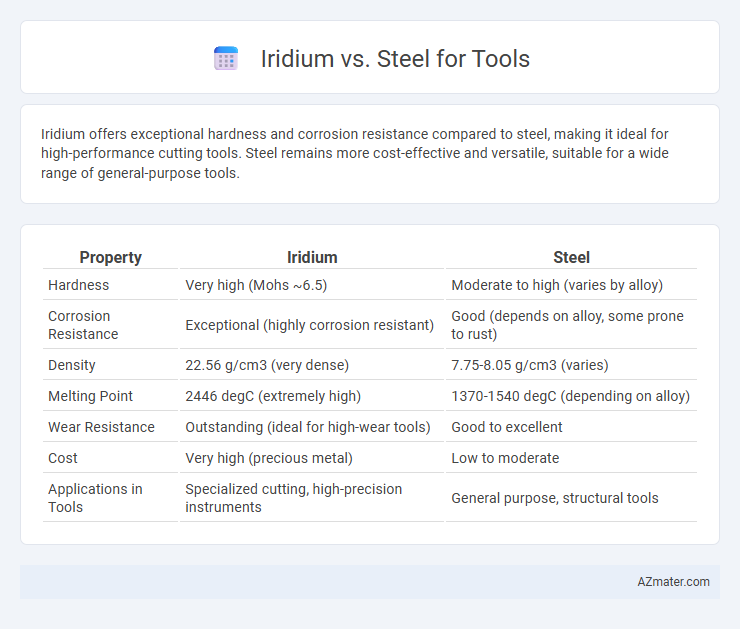Iridium offers exceptional hardness and corrosion resistance compared to steel, making it ideal for high-performance cutting tools. Steel remains more cost-effective and versatile, suitable for a wide range of general-purpose tools.
Table of Comparison
| Property | Iridium | Steel |
|---|---|---|
| Hardness | Very high (Mohs ~6.5) | Moderate to high (varies by alloy) |
| Corrosion Resistance | Exceptional (highly corrosion resistant) | Good (depends on alloy, some prone to rust) |
| Density | 22.56 g/cm3 (very dense) | 7.75-8.05 g/cm3 (varies) |
| Melting Point | 2446 degC (extremely high) | 1370-1540 degC (depending on alloy) |
| Wear Resistance | Outstanding (ideal for high-wear tools) | Good to excellent |
| Cost | Very high (precious metal) | Low to moderate |
| Applications in Tools | Specialized cutting, high-precision instruments | General purpose, structural tools |
Introduction to Iridium and Steel in Toolmaking
Iridium, a rare and corrosion-resistant platinum group metal, offers exceptional hardness and high melting points, making it ideal for precision tools used in extreme environments. Steel, predominantly composed of iron and carbon, provides versatility, durability, and cost-effectiveness, widely utilized in cutting, construction, and mechanical applications. While steel dominates toolmaking due to its strength and machinability, iridium's unique properties cater to specialized tools requiring superior wear resistance and temperature stability.
Key Material Properties: Iridium vs. Steel
Iridium exhibits exceptional hardness, corrosion resistance, and a melting point of 2446degC, making it one of the most durable metals for specialized tools. Steel, especially high-carbon varieties, offers a balance of strength, toughness, and cost-effectiveness with melting points around 1370-1510degC and excellent machinability. For tools requiring extreme wear resistance and chemical stability, iridium outperforms steel, while steel remains preferred for general-purpose applications due to its versatility and affordability.
Durability and Wear Resistance Comparison
Iridium exhibits exceptional durability and wear resistance due to its high hardness and corrosion resistance, outperforming steel in extreme conditions. Steel, particularly high-carbon and alloy varieties, offers robust toughness and impact resistance but tends to wear faster under abrasive environments. Iridium's superior stability makes it ideal for precision tools requiring long-lasting sharpness and minimal material degradation.
Corrosion and Oxidation Resistance Differences
Iridium offers superior corrosion and oxidation resistance compared to steel due to its noble metal properties and strong resistance to chemical reactions in harsh environments. Steel, especially carbon or alloy varieties, is prone to rust and oxidation when exposed to moisture or acidic compounds, requiring protective coatings to enhance durability. The exceptional stability of iridium makes it ideal for tools used in extreme conditions where prolonged exposure to corrosive elements is a concern.
Machinability and Workability
Iridium exhibits exceptional hardness and wear resistance but has limited machinability due to its brittleness and high melting point, making it challenging to shape with traditional tools. Steel, particularly various alloy grades, offers superior machinability and workability, allowing easier cutting, welding, and forming processes essential in tool manufacturing. While iridium tools excel in extreme durability applications, steel remains the preferred material for general-purpose tools where efficient machining and shaping are critical.
Cost and Availability Analysis
Iridium tools exhibit exceptional durability and corrosion resistance but come at a significantly higher cost compared to steel, limiting their widespread use. Steel remains the preferred choice due to its affordability, abundant availability, and versatility across various industrial applications. Market analysis shows steel's dominant supply chain infrastructure ensures consistent availability, whereas iridium's rarity and extraction complexity result in limited accessibility and fluctuating prices.
Applications in Industrial Tools
Iridium's exceptional hardness and high corrosion resistance make it ideal for precision industrial tools used in extreme environments such as aerospace and chemical processing. Steel offers versatility and strength at a lower cost, widely applied in manufacturing cutting tools, blades, and heavy machinery components. Industrial applications demanding durability under high temperatures and corrosive conditions often favor iridium alloys, while general-purpose tools rely on various steel grades for cost-effective performance.
Performance in Extreme Conditions
Iridium exhibits superior performance in extreme conditions due to its exceptional hardness, corrosion resistance, and high melting point of 2446degC, making it ideal for tools exposed to intense heat and chemical environments. Steel, while versatile and cost-effective, tends to lose strength and can corrode under high temperatures and harsh chemical exposure, limiting its durability in extreme conditions. The advanced resilience of iridium tools ensures longer lifespan and reliability where conventional steel tools would fail.
Environmental Impact and Sustainability
Iridium, known for its exceptional corrosion resistance and durability, has a significantly lower environmental impact compared to steel due to its longevity, reducing the frequency of replacement and waste. Steel production involves high energy consumption and greenhouse gas emissions, contributing to environmental degradation, whereas iridium's rarity limits large-scale extraction but offers enhanced sustainability through tool lifespan extension. The sustainability of iridium tools hinges on recycling and responsible mining practices, while steel's widespread recycling infrastructure supports circular economy efforts despite its heavier carbon footprint.
Making the Right Choice: Iridium or Steel for Your Tools
Iridium offers superior hardness and corrosion resistance, making it ideal for precision tools requiring long-lasting sharpness and durability. Steel, particularly high-carbon variants, provides excellent strength and toughness at a lower cost, suitable for general-purpose tools and heavy-duty applications. Choosing between iridium and steel depends on balancing performance needs against budget constraints and specific tool functions.

Infographic: Iridium vs Steel for Tool
 azmater.com
azmater.com